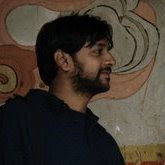A play by the same title was performed today by Parnab Mukerhjee, a development consultant and a creative mentor (don't ask me what that means!) at Koramangala.
The play stitches together three narratives, two of which are short stories by Mahasweta Devi, one of the more prolific short story writers and activists, based in West Bengal, India. The props used in the play were simple- A cloth with a Dali painting- The Persistence of Memory , a miniature face mask, some clips for drying clothes, a clothesline, some rope, black scotch tape, a chair and a bedsheet.
The play begins with the story of Yashodha, a tribal woman somewhere in Purulia, West Bengal, but place is insignificant as it resembles the tribal landscape anywhere else in India. The story is simple- the woman is young but her husband loses both legs in an accident, his employer is a lecherous fellow, and his employer's wife offers her money but she has to breastfeed her grandsons in return. She is a private fascist but just doesn't show it. Soon Yashoda starts breastfeeding other children in return for earning money. There is the conflict of why her identity should be reduced to her breasts only to earn some money but on the outward, she goes through the motions stoically. Soon, she learns that her husband has got property elsewhere and so he abandons her to start life anew with another woman. Her two daughters elope when the time is right. All three family members show disgust at being supported through the breastfeeding money (even though that was the sole means of support for them). Soon she dies from blood cancer.
The story is a front for reserving comment on the state of the Advasi in India, what is the extent to which they occupy the mindscape of ordinary people like you and me, what is the violent displacement they undergo and their miserable integration in to the urban life, by becoming servants, construction workers etc at the expense of state sponsored SEZ type projects.
The second story is that of Ram, who is a photographer who has attained fame by shooting Shurpanaki, an adivasi woman who was shot bare chested in all her innocence. This shot makes it to a calendar sold in New York and she becomes famous. Soon, the fame starts fading, and one day 12 members of the local Panchayat rape her precisely because of her fame. She confronts Ram (who is unaware of this incident) and he tries to placate her with some kind of compensation or rehabilitation, but she is way beyond such talk. She has totally lost all inkling of hope. Ultimately, Shurpanaki, who lives in a Shanty by the railway station in Mumbai, starts running towards the train, with Ram behind her. The newspaper states that two bodies have disappeared, in the next day's news.
The third story is Parnab's personal story, as a middle class failure, who in the days of successful role models, wants to become a model failure by committing suicide in full media glare. And so he invites the media people to cover his suicide, (by cutting himself with the free safety blades he got at an offer at a supermarket). He wants to die because he has no options left. He refers to researchers, academicians, fund loving NGOs, etc who all are a part of this hypocritical society who will watch and discuss and sympathise while the poor are systematically getting raped and murdered all over India.
All through the play, the emphasis was on the body itself. The body became the point of reference, and this was particularly thought provoking because today when everyone is talking about community, globalization and generally of a flat, uniform world; bringing the focus back on the body singles the individual, her feelings, her identity and brings the individual back into the picture. Perhaps this is a comment on how Adivasis are different from the rest of us, how they have always been neglected, been getting the raw end of the deal and how State attitudes and middle class attitudes in India don't really work for these Adivasi individuals whose stories are portrayed in this play. Ultimately, the play hits hard the point that all arts are either escapist or political, and maybe this is true of people on a larger level also, and Parnab provokes us into thinking whether we want to keep on living our lives with our aspirations and escape the realities around us or make a conscious decision to be political and actually have the courage to face the differences of this "socialist, democratic, secular and fairly well known republic called India"
The play does not assume to have any answers to the problem, and does not articulate any specific "social problems" either. All it does is tell some stories, largely unheard stories, and asks us to think about what we as individuals want to do about these stories.
All credit to Logos Theater and Parnab Mukherjee for bringing about this play, for the hard hitting lines and hopefully they will remain etched in memory long enough for us to wake up, sit and take notice.
Tuesday, November 20, 2007
Subscribe to:
Post Comments (Atom)

No comments:
Post a Comment